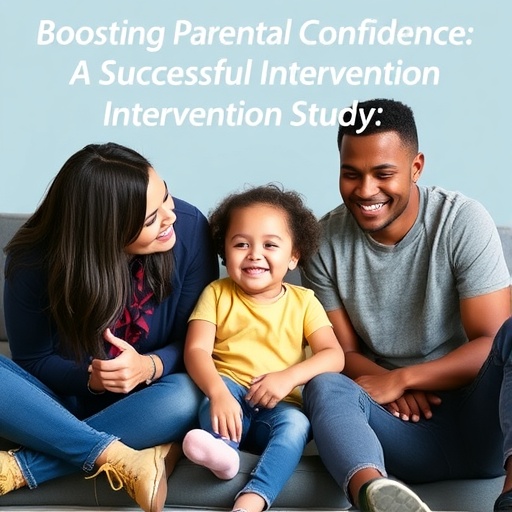In recent years, the dynamics of parenting have become the focus of significant research, particularly concerning the impact of parental self-efficacy and positive parenting outcomes. New findings have emerged from a randomized controlled pilot study conducted by Naoufal, Mouslih, and Montreuil, shedding light on innovative intervention strategies designed to enhance parenting skills. This study, set to be published in the Journal of Child and Family Studies, delves into interventions aimed at improving parents’ self-confidence in their parenting abilities, ultimately leading to better family dynamics and child development outcomes.
Parental self-efficacy is a crucial psychological construct that refers to a parent’s belief in their ability to succeed in the role of a caregiver. This belief can heavily influence a parent’s behavior, choices, and emotional well-being, affecting not only the parents themselves but also their children. The authors have discussed various previous studies that highlight how a solid sense of self-efficacy correlates with positive parenting practices, reduced parenting stress, and improved emotional regulation among children.
The randomized controlled pilot study offers a unique glimpse into the effectiveness of brief interventions designed to promote this self-efficacy among parents. Traditionally, many parenting programs have focused on lengthy workshops and extensive resource materials. However, this new pilot study sought to assess whether shorter, more concentrated interventions could yield significant results in enhancing self-efficacy and boosting positive parenting outcomes.
Participants in this innovative study included a diverse group of parents facing various challenges in their parenting journeys. The rigorous methodology of the study ensured that the assessment of self-efficacy was both comprehensive and precisely measured. Participants were engaged through a series of interactive sessions, which were specifically tailored to address common parenting challenges and improve their confidence in managing them effectively.
What differentiates this study from others is its commitment to replicable and practical interventions that could easily fit into the busy lives of parents. The researchers incorporated practical exercises and role-playing scenarios that allowed parents to apply theoretical knowledge into real-world situations, making the learning process both engaging and effective.
Furthermore, the study highlighted the importance of ongoing support and community engagement throughout the intervention. Parents were encouraged to connect with one another, fostering an environment of shared experiences and emotional support. This social aspect of the intervention not only bolstered individual self-efficacy but also created a community of parents striving for positive change.
In measuring the success of the intervention, quantitative metrics and qualitative feedback were collected. Results indicated statistically significant improvements in parenting self-efficacy among participants. The findings of this pilot study suggest that even brief interventions can play a pivotal role in enhancing parental confidence and improving overall parenting practices.
The implications of such research extend beyond just individual families; they offer a framework for community-level interventions aimed at supporting parents. As societal pressures increase and the challenges of parenting evolve, having efficient and impactful support systems is crucial. This study underscores the potential for incorporating evidence-based interventions into broader public health strategies focused on family welfare.
While the pilot study paves the way for larger scale research, the authors are keenly aware of the limitations inherent within their work. Future studies will need to validate these findings across diverse populations and settings to ensure the robustness of the intervention results. Nevertheless, the insights gained thus far provide a significant stepping stone toward rethinking how we support parents and promote healthy family environments.
This research could herald a new approach to parental support that prioritizes the development of self-efficacy as a central tenet. By emphasizing confidence building, we address not only the immediate needs of parents but also the long-term well-being of children. Children are the ultimate beneficiaries of positive shifts in parenting practices, which can lead to a lifelong trajectory of resilience and success.
As the research community continues to delve deeper into parenting dynamics, studies like this one provide crucial insights that help to inform public policy, educational programs, and community resources. Focusing on parent self-efficacy as a catalyst for change could reshape how society understands and supports the role of parents in day-to-day family life.
Overall, the findings of Naoufal, Mouslih, and Montreuil are a testament to the evolving landscape of parenting research. They highlight the importance of innovative and thought-provoking interventions that can uplift families and promote healthier developmental outcomes for children. With ongoing exploration and adaptation, the future of parenting support looks promising.
In conclusion, the commitment to enhancing parental self-efficacy not merely as a theoretical concept but as a practical focus of research could lead to significant advancements in how we perceive and empower parenting practices. These interventions could very well be the key to fostering a generation of confident and capable parents, consequently enhancing the lives of their children.
Subject of Research: Parental Self-Efficacy and Positive Parenting Outcomes
Article Title: A Brief Intervention Promoting Parenting Self-Efficacy and Positive Parenting Outcomes: A Randomized Controlled Pilot Study
Article References:
Naoufal, M., Mouslih, C.E. & Montreuil, T.C. A Brief Intervention Promoting Parenting Self-Efficacy and Positive Parenting Outcomes: A Randomized Controlled Pilot Study.
J Child Fam Stud (2025). https://doi.org/10.1007/s10826-025-03221-w
Image Credits: AI Generated
DOI: https://doi.org/10.1007/s10826-025-03221-w
Keywords: Parenting Self-Efficacy, Positive Parenting, Interventions, Child Development, Family Studies




